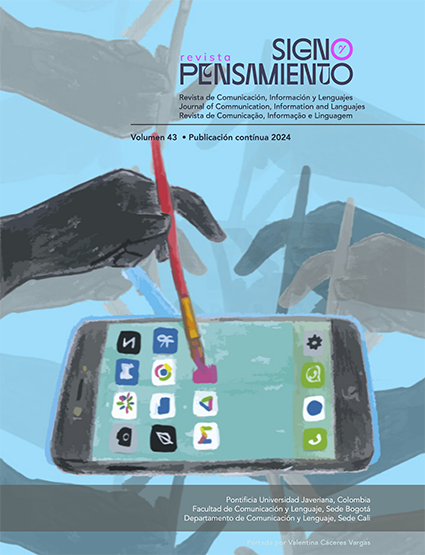Resumo
Este texto aborda una de las cuestiones aún no resueltas en la formación de comunicadores de la ciencia: cuál puede ser el método más adecuado para comunicar temas multidisciplinarios, atendiendo al requisito de que los productos de la comunicación pública de la ciencia (CPC) contengan ciencia, es decir que manejen no solo datos y resultados, sino también los razonamientos y argumentos basados en evidencia empírica necesarios para llegar a explicaciones científicas. Para proponer cómo abordar la CPC en este caso, utilizamos la idea de paradigma y las diferencias entre sus cuatro tipos principales: positivista, realista, hermenéutico e interaccionista; intentamos mostrar la utilidad que revisten para enmarcar la comunicación de temas multidisciplinarios, pues todos ellos permiten acercamientos diferentes para conocer diversos aspectos de la realidad.
Arrhenius, S. (1896). On the influence of carbonic acid in the air upon the temperature on the ground. Philosophical Magazine and Journal of Science, 41(serie 5), 237-276. https://www.rsc.org/images/Arrhenius1896_tcm18-173546.pdf
Brandon, K. R. (2011). The Navier-Stokes Equations [Tesis de licenciatura]. University of Redlands, Estados Unidos.
Caballero, M., Lozano, S. y Ortega, B. (2007). Efecto invernadero, calentamiento global y cambio climático: una perspectiva desde las ciencias de la Tierra. Revista Digital Universitaria, 8(10), 1-12. https://www.revista.unam.mx/vol.8/num10/art78/oct_art78.pdf
Cassidy, A. (2008) Communicating the social sciences: A specific challenge? En M. Bucchi y B. Trench (eds.), Handbook of public communication of science and technology (pp. 186-197). Routledge.
Cassidy, A. (2021) Communicating the social sciences and humanities: Specific challenges - and broader insights for research communication? En M. Bucchi y B. Trench (eds.), Routledge Handbook of Pubic Communication of Science and Technology (pp. 198-213). Routledge.
Chalmers, A. (2001). ¿Qué es esa cosa llamada ciencia? Fondo de Cultura Económica.
Chemistry Channel. (2017). How molecules absorb infra-red radiation [Video]. YouTube. https://www.youtube.com/watch?v=-8OvYZzLZqk
Crúz-Mena, J. (2022). La comunicación pública de ciencia: entre el principio de autoridad y la sociedad del argumento. Universidad Nacional Autónoma de México (UNAM).
Gándara, V. M (2018). Elementos históricos y metodológicos de la interpretación del patrimonio. En M. Gándara y M. A. Jiménez (coords.), Interpretación del patrimonio cultural. Pasos hacia una divulgación significativa en México. Instituto Nacional de Antropología e Historia (INAH).
Gómez-Gurrola, I. y Crúz-Mena, J. (2020). Manual del Perfil de Ciencia para periodistas: cómo contar historias periodísticas con contenido científico. Universidad Nacional Autónoma de México (UNAM). http://ru.ameyalli.dgdc.unam.mx/handle/123456789/448
Government of British Columbia. (2022). British Columbia’s Carbon Tax. Canadá, Victoria, BC. Autor. https://www2.gov.bc.ca/gov/content/environment/climate-change/clean-economy/carbon-tax
International Food Policy Research Institute (IFPRI). (2009). Climate change. Impact on agriculture and costs of adaptation. Autor. https://www.ifpri.org/publication/climate-change-impact-agriculture-and-costs-adaptation
International Plant Protection Convention (IPCC). (2001). Cambio Climático 2001: la base científica. Resúmenes del Grupo de Trabajo I. Autor. https://archive.ipcc.ch/ipccreports/tar/vol4/spanish/pdf/wg1sum.pdf
Kuhn, T. (1971). La estructura de las revoluciones científicas. Fondo de Cultura Económica.
Lee, J. Y., Marotzke, J., Bala, G., Cao, L., Corti, S., Dunne, J. P., Engelbrecht, F., Fischer, E., Fyfe, J. C., Jones, C., Maycock, A., Mutemi, J., Ndiaye, O., Panickal, S. y Zhou, T. (2021). Future Global Climate: Scenario-Based Projections and Near- Term Information. En V. Masson-Delmotte, P. Zhai, A. Pirani, S. L. Connors, C. Péan, S. Berger, N. Caud, Y. Chen, L. Goldfarb, M. I. Gomis, M. Huang, K. Leitzell, E. Lonnoy, J. B. R. Matthews, T. K. Maycock, T. Water eld, O. Yelekçi, R. Yu y B. Zhou (eds.), Climate change 2021: The physical science basis. Contribution of Working Group I to the Sixth Assessment Report of the Intergovernmental Panel on Climate Change (pp. 553-672). Cambridge University Press. http://doi.org/10.1017/9781009157896.006
Lewis, J., Bartlett, A., Riesch, H. y Stephens, N. (2023). Why we need a public understanding of social science. Public Understanding of Science, 32(5), 658-672. https://doi.org/10.1177/09636625221141862
Murray, B. y Rivers, N. (2015). British Columbia’s revenue-neutral carbon tax: A review of the latest “grand experiment” in environmental policy. Energy Policy, 86, 674-683. https://doi.org/10.1016/j.enpol.2015.08.011
National Oceanic and Atmospheric Administration (NOAA). (s. f.). Climate Models. Autor. https://www.climate.gov/maps-data/climate-data-primer/predicting-climate/climate-models
Orozco, G. y R. González, (2012). Una coartada metodológica. Abordales cualitativos en la investigación en comunicación, medios y audiencias. Editorial Tintable.
Rosen, A. (2008). Análisis de la cobertura periodística del cambio climático en 2001 desde un modelo de funcionalidad. El periodismo de ciencia en la prensa escrita nacional y extranjera [Tesis de grado]. Universidad Nacional Autónoma de México (UNAM), México. http://132.248.9.195/ptd2008/septiembre/0632863/Index.html
Rupasinghe, R., Chomel, B. y Martínez-López, B. (2022). Climate change and zoonoses: A review of the current status, knowledge gaps, and future trends. Acta Tropica, 226, 106225. https://doi.org/10.1016/j.actatropica.2021.106225
Sánchez Mora, A. M. (2010). Introducción a la comunicación escrita de la ciencia. Universidad Veracruzana.
World Health Organization (WHO). (2018). Heat and Health. Autor. https://www.who.int/news-room/fact-sheets/detail/climate-change-heat-and-health

Este trabalho encontra-se publicado com a Licença Internacional Creative Commons Atribuição 4.0.
Direitos de Autor (c) 2023 María del Carmen Sánchez-Mora, Javier Crúz-Mena, Ana María Sánchez Mora


